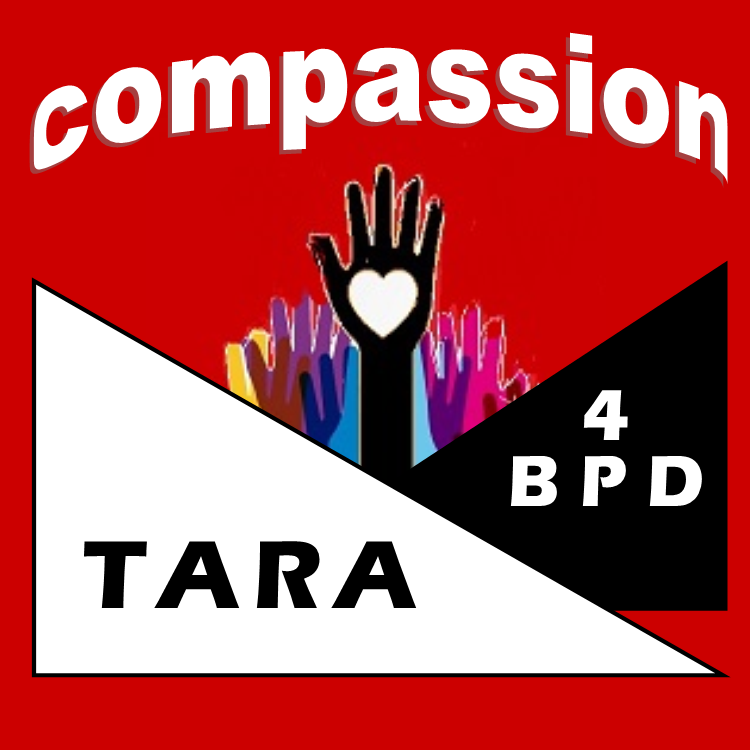|
On Mother's Day
A Mother's Day gift to all of TARA's Mothers
Debunking
Invalidating Environments

|
|
Only people who are capable of loving strongly can also suffer great sorrow, but this same necessity of loving serves to counteract their grief and heals them." Leo Tolstoy
On this Mother's Day, I would like to give very mother the gift of understanding, the gift of science, I hope to relieve the burden of guilt and blame.
If you are reading this letter you are probably the mother of an adult or adolescent son or daughter suffering with Borderline Personality Disorder. He or she may or may not have been diagnosed with BPD, may or may not admit that they have a problem however, in your heart, you know something is very wrong.
For a long while you have probably been aware that your child is different, is unhappy, often feels lonely and rejected, is in pain, just doesn't seem to "fit in". The choices and decisions she makes not only fall short of her goals but may often bring about hurtful consequences to herself and others. She cannot seem to find a comfortable place to be in her own life; no place is "SAFE"; she is not flourishing. Your child is not following the usual path into adulthood, mile markers fall short. If there are siblings, this becomes even more painful as younger or older siblings thrive, highlighting this child's difficulties
As you watch her go from crisis to crisis you are struck with the realization of your own inadequacy to help her, to spare her pain, to help her avoid hurt, to solve her problems. Some of you may be the recipient of intense anger, blame and rejection. Your efforts to help are often criticized and rejected. You are told "you are trying to control me, you were never there for me, you never listen, you just don't understand."
Do you feel like a failure as a mother? You ask yourself where did I go wrong? What did I do or not do? How did this happen to my child, to me, to my family? You remember your expectations when you decided to have a child. You can remember how it felt when the child was inside of you or when you were anticipating her adoption. You had such hopes, so much love to give to this long awaited little person. You anticipated providing her with the best possible life, sharing in her achievements and joys. Instead you are now cast as the villain in a drama, accused of a crime you know you didn't commit. Pain is your constant companion, sorrow walks beside you all the time. No matter what the other areas of your life are like, the pain of this unhappy child accompanies you wherever you go, whatever you do. You grieve every day.
Once you admitted to yourself that something was wrong, you probably sought professional help. For most of you, this journey began in early adolescence, with the onset of puberty and middle school intense peer relationships complicate life. For others, it may have begun with a hard to soothe baby, a hypersensitive child who was a fussy eater, who couldn't stand noises, itchy clothes or smells and may have had difficulty sleeping. The child others described as "shy." Or with a very supposedly hyperactive or aggressive child, prone to tantrums. Unfortunately, babies don't come with a "How To" book. We all do the best we can and it is hard to know what "normal" is. If we ask question, we are usually told, "oh well, they'll grow out if it." Unbeknownst to you, the things you saw or questioned were important. WHO KNEW?
Desperate for help. with the best of intentions, you probably sought professional help. You begin by reaching out to family and friends, consulted with therapists, social workers, psychiatrists, family therapists, or educational consultants. Quite often, the journey begins with your first trip to the emergency room. You may have looked for help as a family or sought counseling for yourself. Surely you spent enormous amounts of money seeking the best help you could find. It is here that the heartbreak often begins.
Although you desperately wanted help, the help you received was most often not helpful. You are told to implement strategies for which evidence shows that these strategies cause harm. (iatrogenic) For example, remain neutral and calm when your child is upset and emotional, institute boundaries and limits, have them sign contracts, do not enable them, don't be "co-dependent'", they are not safe at home, send them to the ER if they cut, hospitalize them if they talk about suicide, send them to residential treatment programs or to wilderness programs. You can't diagnose her because she is not 18. Or, she has BPD traits.... equivalent to being a little pregnant. All of this is bad enough however the worst part is that the professional talking to you sees you as the cause of your child's problems. At best from a psychoanalytic point of view, you are thought of as having failed to "attach" to your child. According to the DBT concepts, you created an invalidating environment for your child. At worst, you are having abused your child. These are the frames of references used by most clinicians unfamiliar with the latest research on BPD.
The Biosocial Theory of BPD developed by Marsha Linehan states that BPD is a complex disorder resulting from certain biological predispositions which manifest themselves when met with a dysfunctional or invalidating environment. BPD is a dysfunction in how bodies regulate emotions in combination with emotional sensitivity and an invalidating environment. This can ultimately trigger BPD. According to Linehan, an invalidating environment isn't necessarily one in which a child is abused or neglected. Even the most well-intentioned families can be invalidating by ignoring, ridiculing, denying, or judging a child's feelings. Making a child believe their thoughts or feelings are just plain wrong without understanding them is invalidating. People who grow up in an invalidating environment learn to believe that their actions, thoughts, and feelings don't matter. This can hinder their ability to recognize and label their emotions, and cause them to distrust their emotions. According to the "theory" of invalidating environments, your child is a bad fit in your family, a mismatch.
Please note, this is a theory. In science, a 'theory' is a scientists' explanations & interpretations of facts. When used in everyday non-scientific speech, "theory" implies that something is an unsubstantiated and speculative guess, conjecture. Search as I may, and I search the literature with frequency, I have not found a study that validates invalidating environments as the cause of BPD. A 2010 study by Reeves et al,found that, consistent with the biosocial theory, the best fitting model indicated that emotional vulnerability and emotional dysregulation were uniquely related to BPD symptoms after controlling for personality traits, and that dysregulation mediated the relationship between emotional vulnerability and BPD. invalidation was not significantly associated with BPD and could be dropped from that model. Studies confirm the genetic heritability of BPD. Additionally, those with BPD have alexithymia, an inability to name their feelings,difficulty naming their own emotional responses plus a heightened sense of their own emotional responses. According to Antonia New, MD of ICAHN My Sina, BPD patients have may really not have a clue about how they are feeling. Yet the clinical community relies on "Self-report" from people with known perceptual biases. Why don't clinician's fact check? All of you know that your version of events does not match your child's version of the same event. Alexithymia is one of the reason why.
How does Invalidating Environment make a mother feel? The "Invalidating Environment" theory sows distrust and dissension with the people who love the person the most, who do not give up. Here are some quotes from TARA family members on how the theory of invalidating environments makes them feel
To make the decision, with loving anticipation, to make a life and bring a child into the world and then to think that the child grows up and wants to kill themselves because of you (you didn't give them a sweater when they said they were cold or made them eat carrots when they said they didn't like them) is beyond hurtful.
The thought of my child in so much pain that they want to end their life because of me and what I inflicted upon them compounds the pain of helplessly seeing the child suffer. You feel helpless, feel as though you are a bad human being.
When you are looking for support, when you bring your child to a clinician for help, the very community that you looked to for compassion blames you, tells you that you need parenting skills and then pathologizes your family. This serves to alienate the families from both the mental health world and society and from their own family members and friends.
The result is depression, despair, confusion, and helplessness. It knocks the ground out from under a parent. It does not give you the strength to fight for your child because, indirectly, in a sanitized way, a "professional" is telling you "you're an incompetent, horrible human being."
The concept of "an Invalidating Environment" is harmful because it naturally drives a wedge between children and their parents, the very parents that they need to help them emotionally and financially.
If you are an adolescent or young adult who is told that the principle cause of your misery, drug addiction, eating disorder, self-injury, binge drinking, social isolation, etc. is an invalidating environment, you will be furious with your parents! And if your parents did cause such misery by raising you in an environment that caused you so much harm, you SHOULD be furious with them. For a person with BPD a "normal' environment" can be misconstrued as an invalidating environment. Due to the structure of their brains, people who suffer from BPD experience their environment as one of constant threat. Since people with BPD have a strong negativity bias, the slightest sigh or micro facial expression can be misinterpreted as proof of a negative reaction or rejection. Therefore, even with the best of intentions, any environment can be perceived as invalidating to someone with BPD. If invalidating environment cause BPD, mothers should develop BPD from the invalidation they receive from their child and the clinical community. Mental illness is a problem within the person that is genetically and neurobiologically based. Anyone can have a disturbed child. Anyone can have problems managing the problems a BPD child presents to a family. Intolerant and blaming attitudes towards families make matters worse. Inappropriate advice from clinicians worsen family relationships (tough love, boundaries, etc.)
Bravo to all the mothers who do not give up, who keep searching for help, for ways to repair the relationships with their troubled child, who keep on giving.
Enjoy your Mother's Day with my sincere wish that I have alleviated any guilt which you do not deserve.
Yours truly,
Valerie Porr,
President/Founder TARA4BPD
|
